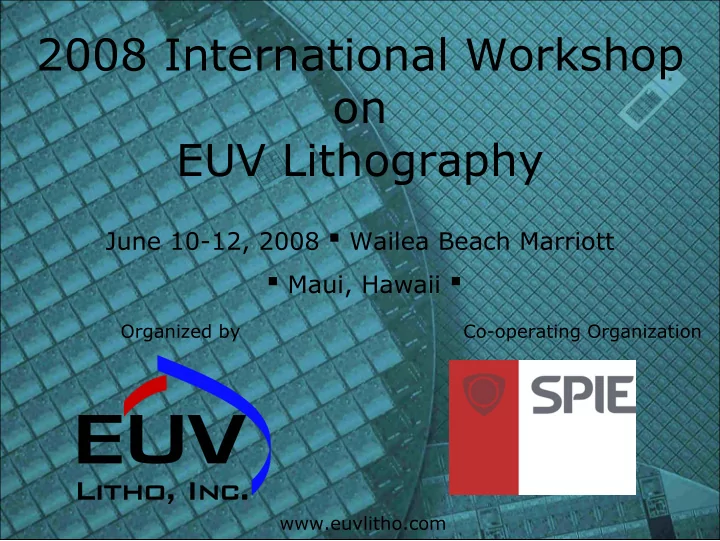

2008 International Workshop on EUV Lithography June 10-12, 2008 ▪ Wailea Beach Marriott ▪ Maui, Hawaii ▪ Organized by Co-operating Organization www.euvlitho.com
2 0 0 8 I nternational W orkshop on EUVL JSR Sponsors
EUV Mask Inspection System 1, 3 , H. Kinoshita 1, 3 , T. T. Yoshizumi,M Yoshizumi,M. . Osugi Osugi, , J. J. Kishimoto Kishimoto, T. , T. H. Kinoshita Sugiyama 2 2 , N. T. Watanabe 1, 3 1, 3 , N. Sakaya Sakaya, K, , K, Hamamoto Hamamoto T. Watanabe Sugiyama 1 University of Hyogo, 1 University of Hyogo, 2 2 HOYA Corporation, HOYA Corporation, 3 Asahi Glass Co., LTD, R & D Center 3 Asahi Glass Co., LTD, R & D Center 4 CREST 4 CREST- -JST JST
Outline 1. Background 2. EUV microscope system 3. Observation results - Resolution - Pit defect 4. Summary
Background EUV lithography is expected to be introduced into the HV manufacturing at the 32-nm hp node between 2011 and 2013. Defect-free mask fabrication is one of the critical issues for introducing EUVL. 6% 77% 6% 11% Substrate pits (77%) Substrate particles (6%) multilayer Multilayer Handling adder (6%) ML deposition adder (11%) glass substrate Substrate pits are now the major source of blank mask Amplitude defect Phase defect Ref: P. Kearney et al., 5 th International EUVL Symposium, Barcelona, Spain 16-18 Oct. 2006
EUV Microscope system NewSUBARU SR X-ray zooming tube Illumination (10X~200X) optics CCD Schwarzschild optics (30X , NA0.3) Specification X-Y-Z stage Resolution: 20 nm Total magnification: 300X~6000X
SR X-ray zooming tube (10X~200X) Schwarzschild optics (30X , NA0.3) 172 nm Source for Mask Cleaning X-Y-Z stage(6025) Load-lock Chamber
Schwarzschild optics Optical housing Concave Convex Diameter 62 mm 22 mm Figure error LSFR (1 mm-) 0.41 nm 0.38 nm Surface roughness MSFR (1 mm-1 μ m) 0.11 nm 0.14 nm HSFR (1 μ m-10 nm) 0.18 nm 0.14 nm WFE: 2.2 nm RMS Delivered from ASML-Tinsley
X-ray zooming tube 3500 3000 Resolution (nm) 2500 2000 Conventional 1500 1000 500 KHI 0 0 50 100 150 200 250 Kawasaki Heavy Industries Magnification Resolution 300 nm (High resolution) Field 1 mm □ @20X 0.5 mm □ @50X
Mechanism of phase defect inspection Various incident angle of ML near line edges λ = 2d sin θ Photocathode (CsI) EUV Reflective optics (Schwarzschild) Mo/Si ML Glass substrate dark region This method inspects a phase defect independent of the surface figure.
Finished EUVL mask observation absorber multilayer Glass substrate TaBN absorber Mo/Si ML 12000 10000 50 nm Intensity (arb.) 8000 6000 4000 2000 0 0 20 40 60 80 100 120 140 Pixel Intensity distribution of the pattern edge 300 nm isolated line (1200X) Resolution of 50 nm is achieved.
Formation of programmed phase defects ESPACER ZEP520A Electron beam (20 nm) (150 nm) Glass substrate 1. Resist coating 2. Electron beam exposure 3. Resist development 6. Multilayer deposition 5. Resist removing 4. Dry etching
AFM image of line patterns on substrate surface (1) ~ Before the coating of Mo/Si multilayer ~ Width:40nm,60nm,80nm,100nm,120nm,200nm 30um Width : 40nm,Depth : 10nm
Observation results by EUV Microscope (1) ~ After the coating of Mo/Si multilayer ~ 40nm,60nm,80nm,100nm,120nm,200nm Marking Line width: 80nm, Depth: 20nm Line width: 60nm, Depth: 15nm Line width: 40nm,Depth: 10nm Marking
Observation results by EUV Microscope (2) ~ After the coating of Mo/Si multilayer ~ 550nm,450nm,350nm,250nm,150nm,100nm,75nm Line width:150nm,Depth:3nm × 1800 Line width:100nm,Depth:2.5nm × 1800 30um Line width:75nm,Depth:1.5nm × 1800 g n i k r a M
AFM image of dot pattern on substrate surface (2) 1 μ m ~ 100nm Pattern depth 4nm for 1 μ m ~ Pattern depth : 200nm 3nm for 100nm 200nm ~ 50nm Pattern depth : 2nm@50nm
Observation results by EUV Microscope (3) 50nm,Depth2nm 100nm,Depth 3nm Marking m n 4 h t p e D , m m n n 0 0 4 2 h t p e D , m n 0 0 600nm,Depth 4nm 4 unprintable m n 4 h t p e D , m n 0 0 8 h t p e D , m μ μ 1 m n printable 4 Marking
The summary of phase defect printability(2) : Dot Printable point : Dot Unprintable point 10 Printable Area Depth (nm) 5 2 Unprintable Area 1 50 10 20 200 400 100 Width (nm) : Line Printable point : Line Unprintable point
Printable or Non-printable Phase defect Measurement by SEMATECH(2007) Hakseung Han etl.,Proc.of SPIE Vol. 6517 65170B-1
Comparison with SEMATECH and our resullts Confirmed Area 10 : Line & Dot Printable : Line &Dot Unprintable Depth (nm) 5 Printable Printable Phase Defect Area by simulation 2 Test Simulation Non-Printable Unprintable Area 1 10 20 50 200 100 Width (nm)
Summary 1. We have constructed an EUV microscope for observing an aerial image of an EUV mask. 2. Using the EUV microscope, images of a finished mask were observed clearly. 3. For a programmed pit defect of 75-nm width and 1.5-nm depth could not be observed. Also, dot defect of 50nm wide and 2nm depth could not observed. We conclude the critical dimension of pit on glass substrate is 2 nm in depth. 4. By Comparison with SEMATECH exposure data, a reliability of EUVM was demonstrated.
Recommend
More recommend